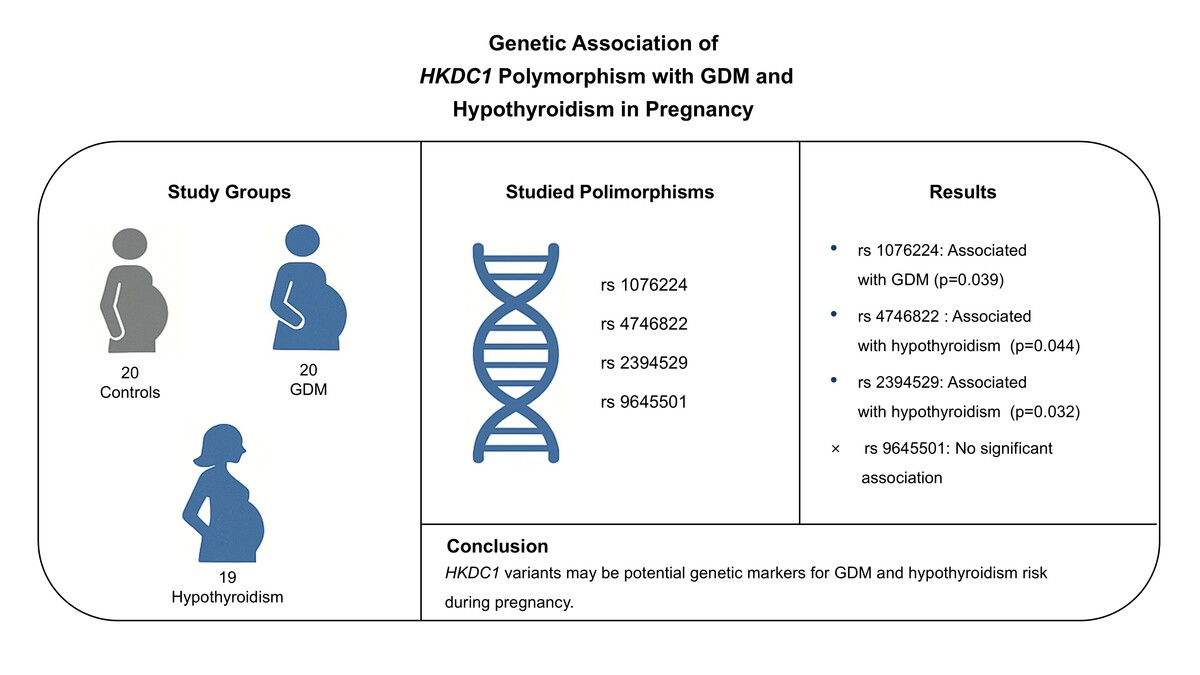Current issue
Archive
Manuscripts accepted
About the Journal
Editorial office
Editorial board
Section Editors
Abstracting and indexing
Subscription
Contact
Ethical standards and procedures
Most read articles
Instructions for authors
Article Processing Charge (APC)
Regulations of paying article processing charge (APC)
DIAGNOSTICS, LABORATORY / RESEARCH PAPER
Impact of HKDC1 Genetic Variants on Gestational Diabetes and Hypothyroidism in Pregnancy - A Pilot Study
1
Department of Clinical Biochemistry, Jagiellonian University Medical College, Poland
2
Chair of Gynecology and Obstetrics, Jagiellonian University Medical College, Poland
3
Department of Gynecology and Endocrinology, University Hospital, Poland
4
Center for Innovative Medical Education, Jagiellonian University Medical College, Poland
5
Department of Bioinformatics and Telemedicine, Jagiellonian University Medical College, Poland
Submission date: 2025-03-20
Final revision date: 2025-05-11
Acceptance date: 2025-05-30
Online publication date: 2025-06-24
Corresponding author
Katarzyna Gawlik
Department of Clinical Biochemistry, Jagiellonian University Medical College, Krakow, Poland
Department of Clinical Biochemistry, Jagiellonian University Medical College, Krakow, Poland
KEYWORDS
pregnancysingle nucleotide polymorphism (SNP)gestational diabetes mellitus (GDM)hypothyroidismheksokinase domain containing 1 gene (HKDC1)
TOPICS
ABSTRACT
Introduction:
Gestational diabetes mellitus (GDM) and hypothyroidism are common pregnancy-related disorders that may have a genetic background. The hexokinase domain containing 1 (HKDC1) gene is involved in glucose metabolism, and its variants may influence thyroid function by modulating metabolic pathways. This interaction could contribute to the development of thyroid dysfunction.
Material and methods:
A total of 20 healthy pregnant controls, 20 pregnant women with GDM, and 19 pregnant women with hypothyroidism were genotyped for the HKDC1 gene polymorphisms rs1076224, rs4746822, rs2394529, and rs9645501.
Results:
Statistically significant differences were found in the genotype distribution of the HKDC1 rs1076224 polymorphism in the dominant model (G/G vs. A/G + A/A) between women with and without GDM (p = 0.039). Additionally, the HKDC1 rs4746822 polymorphism showed significant differences in both the codominant (p = 0.044) and overdominant (p = 0.014) models between hypothyroid and non-hypothyroid pregnant women. The rs2394529 polymorphism also demonstrated significant differences in the overdominant model (C/C + G/G vs. C/G, p = 0.032) between hypothyroid and non-hypothyroid groups. However, no differences were observed in the genotype or allele frequencies of the HKDC1 rs9645501 variant across the study groups.
Conclusions:
This study suggests a potential genetic association between HKDC1 polymorphisms and the risk of GDM and hypothyroidism in pregnancy. The findings highlight rs1076224 as a significant marker for GDM susceptibility, and rs4746822 and rs2394529 as potential markers for hypothyroidism. Further large-scale studies are needed to confirm these associations and understand their clinical implications.
Gestational diabetes mellitus (GDM) and hypothyroidism are common pregnancy-related disorders that may have a genetic background. The hexokinase domain containing 1 (HKDC1) gene is involved in glucose metabolism, and its variants may influence thyroid function by modulating metabolic pathways. This interaction could contribute to the development of thyroid dysfunction.
Material and methods:
A total of 20 healthy pregnant controls, 20 pregnant women with GDM, and 19 pregnant women with hypothyroidism were genotyped for the HKDC1 gene polymorphisms rs1076224, rs4746822, rs2394529, and rs9645501.
Results:
Statistically significant differences were found in the genotype distribution of the HKDC1 rs1076224 polymorphism in the dominant model (G/G vs. A/G + A/A) between women with and without GDM (p = 0.039). Additionally, the HKDC1 rs4746822 polymorphism showed significant differences in both the codominant (p = 0.044) and overdominant (p = 0.014) models between hypothyroid and non-hypothyroid pregnant women. The rs2394529 polymorphism also demonstrated significant differences in the overdominant model (C/C + G/G vs. C/G, p = 0.032) between hypothyroid and non-hypothyroid groups. However, no differences were observed in the genotype or allele frequencies of the HKDC1 rs9645501 variant across the study groups.
Conclusions:
This study suggests a potential genetic association between HKDC1 polymorphisms and the risk of GDM and hypothyroidism in pregnancy. The findings highlight rs1076224 as a significant marker for GDM susceptibility, and rs4746822 and rs2394529 as potential markers for hypothyroidism. Further large-scale studies are needed to confirm these associations and understand their clinical implications.
Share
RELATED ARTICLE
We process personal data collected when visiting the website. The function of obtaining information about users and their behavior is carried out by voluntarily entered information in forms and saving cookies in end devices. Data, including cookies, are used to provide services, improve the user experience and to analyze the traffic in accordance with the Privacy policy. Data are also collected and processed by Google Analytics tool (more).
You can change cookies settings in your browser. Restricted use of cookies in the browser configuration may affect some functionalities of the website.
You can change cookies settings in your browser. Restricted use of cookies in the browser configuration may affect some functionalities of the website.



